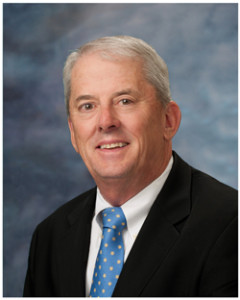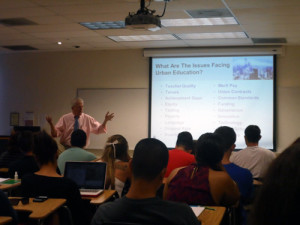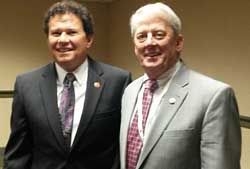By Donald H. Harrison


SAN DIEGO—If one quality seems to characterize Bernie Rhinerson, a member of the San Diego Community College board, it is an openness to well-thought-out change.
After marrying Bobbie Herdes, whom he met while both were students at the University of Wisconsin, Rhinerson, who was raised as a Roman Catholic, read Mixed Blessings by Paul and Rachel Cowan. The two sociologists agreed in that book that children whose parents try to raise them simultaneously in the Christian and Jewish traditions typically end up with no affinity to either.
“I thought I don’t want that for my kids, I think it is better to have one identity,” Rhinerson said. So he began to think seriously about converting to his wife’s Jewish faith, remembering that “my dad was a Lutheran and my mother was an Irish Catholic and when I took my First Communion my dad converted to Catholicism so he could take First Communion with me. I always remembered that because before that, when I was a kid, he would stay at home and mom would take us to mass. But he converted to Catholicism for the family, and then he went to Mass every Sunday of his life until he died when he was 93.”
Rhinerson studied with Rabbi Deborah Prinz at Temple Adat Shalom in Poway, and the couple’s children Devin and Dana were raised as Jews. The son, having served on the staff of Sen. Dianne Feinstein for seven years, works today as a lobbyist in Washington D.C., while the daughter is a teacher in the San Francisco area.
That old saw about apples not falling far from the tree seemed doubly true in the case of Rhinerson’s children. Government relations was his specialty for many years and more recently education has dominated his life. Early in his career, he worked on the staff of City Councilmember Mike Gotch, and later went to work for the public affairs firm headed by Gail Stoorza and Alan Ziegaus. Later Ziegaus formed Southwest Strategies, and Rhinerson continued with him. One of the communications and public relations campaigns that Rhinerson’s children, then very young, were quite pleased he took on was persuading governmental bodies and members of the public that building Legoland in Carlsbad would be a wonderful amenity for San Diego County. Rhinerson remembers that campaign as having one of the best perks of his business career. His Legoland clients decided to send him to Denmark so he could visit the original Legoland and be able to describe first-hand to San Diego County residents what it was like.

During his time working with the public affairs firm, Rhinerson began teaching classes in public administration at San Diego State University, a position that continues to this day to give him an insider’s view of public education.
When he was 59, he decided to “re-wire, not retire” and to take a position supervising communications and government affairs for the San Diego Unified School District. Eventually he became chief of staff for external affairs under Superintendent Bill Kowba. It was a time that Rhinerson remembered as being the toughest years from a budget standpoint in the history of San Diego City Schools.
Cuts in the amount of money available to the schools meant that budgets had to be slashed. Under Kowba’s administration, he said, the priority was to “avoid teacher layoffs as much as possible, and to keep the teachers in front of the kids.”
This meant layoffs, retirements, and attrition elsewhere in the school system, especially in the administrative offices. For example, he said, his own staff went from five people to one person, the school district’s representative in Sacramento.
As budgets were being cut, recalled Rhinerson, “we tried to be as direct and straightforward as we could. The Board of Education now and when I was there shared the philosophy of being very open and transparent to the public.”
Rhinerson retired at the same time that Superintendent Kowba did, clearing the way for the new superintendent, Cindy Marten, to pick her own staff. Rhinerson was elected in 2012 to the Community College board of trustees, filling a vacancy created by the retirement of board member Bill Schwandt, who had completed three terms. In addition, Rhinerson does some part-time consulting in public affairs.
Having taught at a state college and having been a key staff member for a large K-12 district, Rhinerson brought his educational experience and perspective to the community college system, where Chancellor Constance Carroll has worked closely for a decade with a cohesive board overseeing Mesa College, Miramar College, San Diego City College, and an Educational Center in the City Heights neighborhood of San Diego.
I asked Rhinerson if closer coordination is necessary between the San Diego Unified School District, where he once worked, and the San Diego Community College System, which he now helps to lead. He responded that for three years now, the boards of the two educational systems hold joint meetings. Currently, he said, the two systems are working to make certain that “we get our two curricula aligned in math and in English so that, for example, our college-level math professors know what is being taught in high school.” Besides the two boards meeting together, he noted, the chancellor and the superintendent meet on a regular basis “and we are making sure that the pathways are aligned and I think this will show real positive benefits for students.”
In his State of the Union Message on Jan. 20, President Obama called for free community college educations nationwide. Asked his reaction, Rhinerson responded that in California, community college fees are relatively inexpensive and that there are fee waivers for students from poor families. On the other hand, he said, some of the community colleges in the Eastern states are comparatively expensive.
He recalled in our interview that there once was a time when high schools were not mandatory, nor free, but the nation decided that education through the 12th grade for youngsters would be of general benefit to society. Today, he suggested, it is necessary for more students to have access to higher education if the United States is to remain a world leader in various fields of inquiry.
“I think any investment in public education is a good thing, and it would bring a good return,” said Rhinerson. “Having a higher educated populace will return dollars back to the government and the economy. What I like about the President doing it is that it starts a really big conversation about the importance of higher education and how government should promote it.”
Although prospects of the Republican Congress approving this proposal seem dim, Rhinerson said the President’s proposal may elevate educational finance to an important issue in the 2016 presidential race.
“What do the other presidential candidates think they are going to do about improving college access and affordability? If this isn’t the right policy proposal, then what can we do? Can we do something with the student loans? … That is the way that public policy is formed and I am pleased to see the President stepping out in front of it.”
Student loans indebtedness is far too high and is a factor in the nation not having enough well-educated students to fill well-paying American jobs.

Rhinerson said a pilot program recently steered through the Legislature by State Senator Marty Block (D-San Diego), who himself was once a member of the same San Diego Community College Board, may make an important contribution to meeting the goal of making higher education more affordable to more people.
The pilot program, just enacted, permits ten community colleges throughout California—including Mesa College in the San Diego Community College District, and Mira Costa College in the North County—to offer four year degrees in subjects that are not already being offered for baccalaureates by nearby campuses of the University of California or by the State University and College System. Mesa College will offer a degree in health information management, Rhinerson said.
Given that the Public Policy Institute of California estimates by 2025 California will face a shortage of 1 million college degree and certificate holders needed to fuel its workforce, permitting the 112 community colleges in the state, with their less expensive fees, to offer bachelor’s degrees may help close the gap. However, as the restrictions concerning the 10 pilot programs attest, there is potential for a turf battle among the different college systems.
Said Rhinerson, ever an advocate for reasoned change: “I am hopeful that over time when we see the value we are creating with baccalaureate programs that they can be expanded. It is like anything we see in public affairs it’s a matter of getting people to understand the value… “
*
Harrison is editor of San Diego Jewish World. Your comment is welcome in the space provided below or it may be sent to donald.harrison@sdjewishworld.com